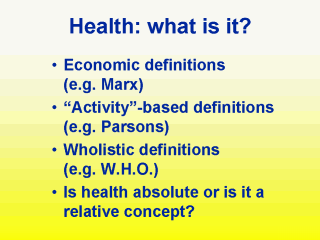 |
What is health? We all know it
when we feel it, but how do we know it? Is there an absolute level of health? How do we
know it when we see it in another person? If a person can walk and talk, can they be
considered healthy, even if they can’t do anything else? Or is it necessary that they reach a fixed
level of performance before being considered healthy? Karl Marx, the “Father” of Communism, was an economist. He defined health as a commodity,
like money (which is what you’d expect from an economist!). Marx defined health as the capacity
to do work. On the other side of the Atlantic, the American sociologist Parsons elaborated
Marx’s definition to the
capacity to do productive work. These definitions were largely unchallenged until nearly
30 years ago when the World Health Organization (WHO) defined health not merely as the
absence of disease, but as”
a positive state of complete physical, social and mental wellbeing.” Comparisons of these definitions
shows, whereas most people would be healthy by Marx’s definition, far fewer of us would be by the WHO definition. Even
when we consider the work-capacity definitions, a moment ’s thought indicates you would want, no, demand a higher level of
health in an airline pilot than in a clerk. This suggests that health is relative. Also,
we know from our own experience that one day we may feel more healthy, almost to WHO
standards, but on other days we may not even meet the basics of Marx’s definition. The question arises, if
we are to do things that affect health, how can we begin to measure it to see if the
intervention actually works or not? |
